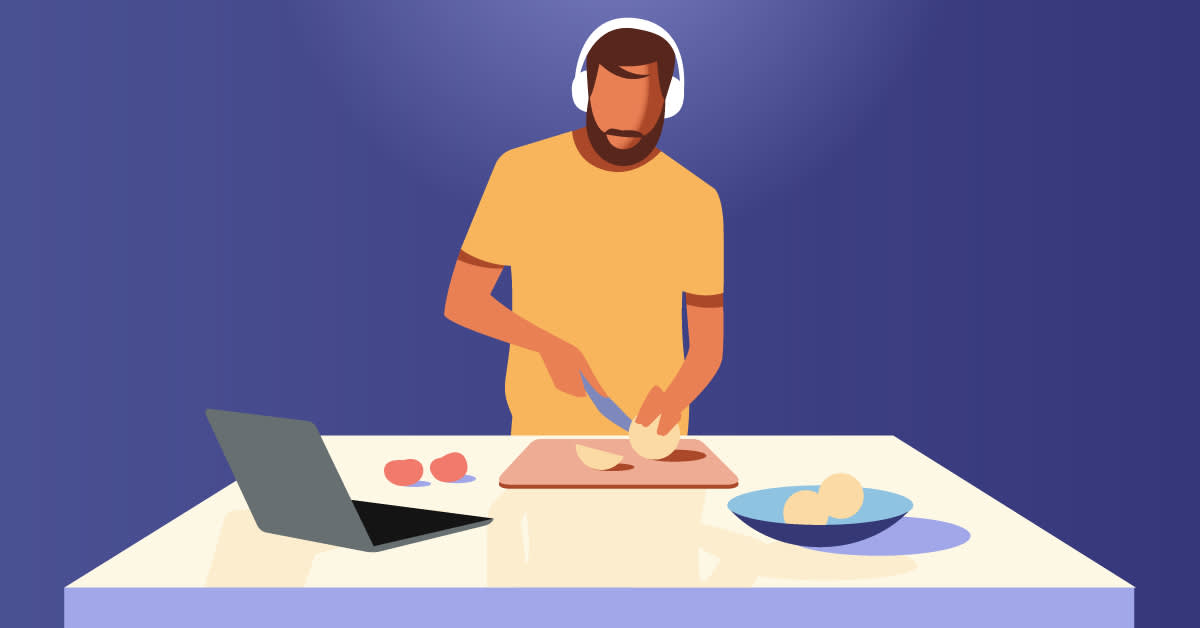Your Mama's Kitchen Episode 18: George Takei
Audible Originals presents Your Mama's Kitchen, hosted by Michele Norris.
George Takei I have fond memories of my mother's cooking after we were released and our next home was in Mexican-American barrio. And everybody was Mexican. We were the only Japanese family, much less Asian family in our neighborhood of East L.A. My mother made friends with Mrs. Gonzalez, our neighbor, and they lived in each other's kitchens. And she learned how to cook Mexican. It was great. The best tacos and enchiladas were made by Mrs. Takei in East L.A.
Michele Welcome to Your Mama's Kitchen, the podcast that explores how we're shaped as adults by the kitchens we grew up in as kids. I'm Michele Norris. On this episode, I'm talking to actor, author and activist George Takei, and this is going to be a very special conversation.
George is probably best known for playing Lieutenant Hikaru Sulu in Star Trek. A brave man who always kept his cool when things got a little hairy or the Starship Enterprise was exploring the final frontier. In real life, George has also explored several frontiers as a beloved actor celebrated across the globe. As an activist who consistently speaks out about human rights and civil rights as a vocal and effective advocate for LGBTQ plus rights, and as an elder statesman that uses his youthful energy to get young people involved in politics.
When you get to know George, it's easy to see why his whole life has been shaped by politics. Laughter comes easy for him. He's got a playful, almost mercurial sense of humor, and you'll hear that in this conversation. But that stands in stark contrast to a very painful family history. George Takei's family members were among the more than 120,000 people of Japanese ancestry that were rounded up and shipped away against their will to relocation camps after the Japanese military surprise attack on Pearl Harbor. Those families had to leave behind businesses, farms, homes and most of their belongings.
This can be hard listening, but I'm grateful to George for reaching back and sharing these stories with us. This is a conversation about loss, but also about strength and resilience and how food and family were at the center of all of that. In this episode, George Takei on overcoming a painful past, finding early acceptance among the Latino community and East L.A., gaining stardom through Star Trek and the food that has sustained him throughout his life, including a dish called Japanese Footballs. Trust me, they sound delicious.
Michele George Takei, thank you so much for being with us. I was really looking forward to this conversation.
George Takei Well, we waited a long time for this.
Michele So we're going to make sure that it's worth it. I'm so very glad that you are with us. This is a podcast that explores how the things that we saw and heard and experience and felt in our kitchens And so as you think about the kitchens of your youth, because your family moved around a lot, what are the sights and the smells and the sounds that you think about when you close your eyes and think about your mama's kitchen?
George Takei Well, I had a very unusual American childhood. I grew up behind American barbed wire fences with sentry towers and armed soldiers in them. And in the second camp we went to, in addition to the armed soldiers, we had machine guns pointed down at us. Pearl Harbor was bombed. And overnight we were looked at with suspicion. We're Americans. My mother was born in Sacramento, California. My father was a San Franciscan. We three kids were born in Los Angeles, but we look exactly like the people that bombed Pearl Harbor. But we lived in the United States. 125,000 of us were living on the West Coast, and this country went crazy. Racism and war hysteria is a venomous combination. They looked at us with suspicion and fear and outright hatred when we had nothing to do with Pearl Harbor.
My parents were spat at, yelled at and assaulted on the street. My father's car was painted in red with three letters J-A-P on it. Some of our Japanese-American friends had rocks thrown through their windows. And. Even the great president of the United States got swept up in it. He signed Executive Order 9066, which ordered all Japanese Americans on the West Coast from the Mexican border to the Canadian border to be summarily rounded up. With no charge, no trial, no due process. And I still remember I was a five year old child. But I remember that morning in May when our father came into the bedroom, I shared with my brother Henry. He dressed us hurriedly and told us to wait in the living room while he and our mother did some last minute packing. We had a baby sister. She was an infant in a crib in our parents’ bedroom. And so Henry and I were dressed and we went to the living room. Standing by the front window, just gazing out at the neighborhood. And suddenly we saw two soldiers, American soldiers, marching up our driveway. They carried rifles with shiny bayonets on them. They stomped up the front porch and with their fists began banging on the front door. Henry and I were petrified.
My father came out of my parents’ bedroom, answered the door, and one of the soldiers pointed his bayonet at our father. The other soldiers said, get your family out of this house, our home. My father gave Henry and me boxes about this size tied in twine.
They had prepared that. And he hefted two heavy suitcases, and we followed him out onto the driveway. And we waited for our mother to come out. And when my mother came out, escorted by the other soldier, she had our baby sister in one arm and a huge duffel bag in the other. And tears were streaming down her cheeks.
That morning is seared into my memory. I'm 86 years old, but I still remember that morning in May of 1942. And so from then on, for the next four years. My mother didn't have a kitchen. We all ate in a mess hall. We were first taken to the. Santa Anita racetrack. We were taken to a bus caravan about four busses, and we were unloaded, herded over to the stable area, and each family was assigned a horse stall to sleep in. On the ground. Insects skittering about the stench of horse manure was still fresh. Flies were buzzing in the air. And I remember my mother mumbling, “So degrading. So degrading.”
And we lined up in mile long lines for slop that they fed us. We were there for about four months. And then they announced that we're going to be traveling again, but this time. By train. We'd never ridden on a train before. So we were excited. But all the grownups were so solemn and some of the ladies were weeping.
It was a journey of three days and two nights. Through the southwestern desert. And finally, on the third morning, we started seeing vegetation. And as we went further. More vegetation and then lush vegetation. There were these huge, big trees rising up out of black water. My father told and told us it was the swamps. Those are swamp trees. And then the train started to slow down and before too much longer, we saw barbed wire fences beside the train window.
They built the prison camp right. Parallel to the railroad track and. Then we started seeing hoards, masses of Japanese people just standing there looking up at us. And beyond the people I saw rows and rows and rows of black tar paper barrack. One of them was one unit, in one of those black tar paper barracks was to be our home.
Michele Hmm.
George Takei This was a place. A camp called Camp Rohwer. R-o-h-w-e-r. It was two barracks that were mashed together and that's where we had our meals. And I remember my mother saying. I love cooking for my children. That was after the war, she said. The most painful part was not having a kitchen to cook for my family.
Michele Hmm.
George Takei After we were released and I was in my early teens, I was very curious about the internment. And I asked my father about after dinner. I peppered him with questions and he said, Well, one of our first meals was Beef Brain. And I said, What? He said, We didn't know what it was either. It was this brown stuff. That was what they fed us. So my childhood mother's kitchen didn't exist.
Michele May I ask a question about when you left your home? When you were taken from your home? You and your brother each had a box. Your father had two suitcases. You described that your mother had your baby sister in one arm and a big duffel bag in the other. And most of us can't imagine. You're told you have to pack everything up and you might not be able to come back. What do you put inside that bag to try to create a life in a place that you don't even know about? You don't even know where you're going. What did your mother and she only had one arm because she had to care for that baby. That baby was so young. What did she put in that duffel bag to help prepare you for a journey that she couldn't even comprehend?
George Takei Her duffel bag was very heavy. My mother was a stout lady, and she could heft that heavy duffel bag. And on the train trip to Arkansas for us, for Henry and me as kids. My baby sister was just an infant. That was a magical duffel bag because whenever we got little whiny or antsy, she would dig in there and find a crackerjack box or an animal cracker or a couple of lollipops. And so that was a wonderful gift-loaded duffel bag. But she had something else there that we didn't know about. My father didn't know what she had either. And she kept. My father tried to help her and she said, no, I'll carry. She had bundles of baby blankets wrapped around something heavy and she pulled it out and unwrapped it. And lo and behold, it was her new portable sewing machine.
Michele Hmm.
George Takei That was contraband. Any mechanical thing with sharp points or sharp edges was verboten. And she knew it. And she marched past all those armed MPs with that heavy bag. And when my father saw that he was aghast, he was shocked. He didn't know what to think. And she said, “Children will be needing clothes.” She was thinking of the future. Little children grow fast. They grow out of the clothes. And so that's why she brought that portable sewing machine. And it was new. So she my mother doesn't like to waste things. She does. Even food she brought back from the mess hall so that we could have it for a snack later on.
Michele George Takei, I want to ask you about what life was like when you were finally allowed to leave those camps and you went back to Southern California. Was there any kind of reentry program? Was there any kind of apology? Was there any kind of effort to help a family like yours get back on their feet?
George Takei We were all impoverished, as I said. Shortly after Pearl Harbor, they froze our bank accounts. They destroyed my father's business. We couldn't pay the mortgage on our house, so we didn't pay it. Everything was taken from us and we were imprisoned.
The gates were all thrown open. The government gave us each, every one of us. 125,000 of us, a one way ticket to anywhere in the United States, plus $25 to start life. A new from nothing. $25. And the hatred was still intense. The war may be over, but the attitudes and the discrimination was intense. Jobs were near impossible. Housing was impossible. Our first home was on Skid Row in downtown Los Angeles. It was a horrific homecoming. And Skid Row, where the stench of human excrement everywhere. On the sidewalk, in the hallways of the flophouse that became our home. So from that, my parents worked long, hard, killing hours, working the fingers, the bones. My father's first job was as a dishwasher in a Chinatown restaurant. Only other Asians would hire us. So it took them four years of scrimping and saving and getting a little savings put together. And they had the down payment on a three-bedroom, two-bathroom home in the old Wilshire District.
Michele As your family moved in and started to establish themselves and got their financial footing and, you know, were able to enter a phase of, I guess reentry. How did your mother take that space, the kitchen and try to use that as a place that provided not just nourishment, but also stability for her family?
George Takei Well, it was. I have fond memories of my mother's cooking. After we were released and we moved to a on Skid Row. Flophouse did not have a kitchen, but our next home was in the Mexican-American barrio. And everybody was Mexican. We were the only Japanese family, much less Asian family in our neighborhood of East L.A. And my mother made friends with Mrs. Gonzalez, our neighbor, and they lived in each other's kitchens. And she learned how to cook Mexican. And we, Henry and I, thought it was great. The best tacos and enchiladas were made by Mrs. Takei in East L.A. Henry and I had taco-eating contests in the kitchen. And because we were so enthusiastic about eating her tacos, we started gaining weight.
Michele Hmm.
George Takei And my mother, especially because there was such privation, she got things that were too rich for us to eat. And we got fat. Walking home with my friend Onorato. He would invite me over to visit his mother's kitchen. And I still remember the rich aroma of fresh corn tortilla just freshly made. You walked in the back door, and that was where Onaratu mother's kitchen was. And the whole room was filled with that wonderful aroma. And she would take a fresh tortilla and spread some frijoles that's bean on it and roll it up. And we had that as an after school snack. And sometimes I got Onorato to come. We lived a little further away Onarato to come rather than my stopping in his mother's kitchen. And my mother takes to hers special that after-school treat for us. And she wanted something very American. We had white Wonder Bread. and she gave Onoratu and me white bread with white sugar on it.
Michele It's a sugar sandwich.
George Takei It was so good and so bad for us.
Michele We're on a podcast so people can't see you. But I wish they could because when you're describing this kitchen, the joy is apparent. You know, you're almost pantomiming what she's cooking. I see you're doing the motions and the wide smile on your face. Kitchens can do that for us. They can they can provide a memory that is just so vivid that you feel it in your mind, but you really almost feel it in your gut, in your soul in a way, also.
George Takei Well, it was much better than the food in the mess hall. But you know, I wasn't introduced to Japanese food when we came out of camp because we were living in East L.A. and our budget was very, very limited. And it wasn't until after I was about 10 years old that they introduced me to sushi. And what a discovery that was. That fresh slice of tuna, red, almost like beef. And you bite into it and you feel the raw meat in in your mouth. And that vinegared rice. It was so delicious. And this is Japanese food. But because I spent my formative years… I couldn't use the chopstick. I never learned how to use chopstick. Until I was 10, and my parents started to take us downtown to Little Tokyo. And sushi and sashimi and all the other wonderful dishes. And so I am a terrible Japanese American. Unable to. I embarrass myself in Japanese.
Michele Oh, you still can't use chopsticks.
George Takei I still cannot, just flops over. Some of my Caucasian friends can use it well.
Michele What made you decide to start acting? How did that transition happen in your life? Was that something that started when you were a student in high school, or did it happen much later?
George Takei My mother said when I was born and she heard my yowl, she had the sense that any child with that kind of strong voice has got a little theater in them. And sure enough, I was a show-off kid. My parents would have guests at home. This is before the war. And so I'd come bouncing out and say, I learned “Twinkle, Twinkle, Little Star” today. Would you like me to do it for you? And I would perform for there for them. And in imprisonment itself too every other month after dinner, the mess hall would be cleared away. The benches would be lined up, and they showed movies, old Hollywood movies in the mess hall. And Henry and I were just transported by the movies. I really remember Charles Laughton in The Hunchback of Notre Dame. He was such a nice but poor man. And he's suffered so much. And my father said he walks straight. He's a regular human being. He's an actor. And I thought he must be a fantastic actor. And I also remember Snow White in color. All the other movies we saw were black and white, and Snow White in color. And with all that music. Hi ho, hi ho, ho, ho. The dwarf singing that was transporting. And occasionally they showed old Japanese samurai movies, but they apparently lost the soundtrack for it because it always came with this man who sat below the screen and to the side a bit. And he had a little lamp. And he had a script, and he did all the dialogue of all the characters. And he had a young man there to help him with all this sword fight sounds. And he did the voices for all the other actors. The samurai, the Shogun, the princess. One man, the Shogun would go [speaks Japanese] And the samurai would say [speaks Japanese] And the princess would go [speaks Japanese].
One man doing all these voices. The princess, the Shogun. The samurai. Absolutely fascinating. One man. And my father said, that's an actor. And sure enough, when we were released from camp, my father bought a portable radio while we were still living on Skid Row and suddenly the world opened up. Green Hornet, B Bar B in the Bobby Benson and the Riders of the Range. It was the movies that helped me escape the barbed wire fence, vicariously. And on Skid Row, I went to New York and saw The Green Hornet. Roaring through Manhattan and cowboy stories of the American West.
Michele All thanks to the radio.
George Takei Yes. And I heard Gene Autry, I think it was, who sang “Don't Fence Me In,” a popular song. Like the way we thought when we were fenced in. Oh, give me land. Lots of land under starry skies above. Don't fence me in. Let me ride through the wide open country that I love. Don't fence me in. This box called radio was wonderful. And this is what freedom means. Music, entertainment and movies were staged for radio. Lux Radio Theater. And I still remember the music that came on. This is William Keely with Lux Radio Theater. Nah, nah, nah, nah, nah, nah, nah, nah, nah, nah, nah. I mean, it was a wonderful magic box set and just sound and voice. The human voice provided me with all that escape.
Michele As you grew as an actor and started taking on more and more roles, you know, many of us know love will forever remember you as Sulu. When you auditioned for that role, did you understand that playing that particular role on that particular show would forever define your life and particularly your life as an actor?
George Takei I didn't quite think that way, but I thought it was a great, wonderful opportunity. First of all, for me personally, it was a pilot film for a series, which means if it's sold, it's regular employment.
But also, Gene Roddenberry, the creator of Star Trek, explained to me something about his philosophy for the show. He said the 1960s is turbulent with a lot of stories that could be told. The civil rights movement with African-Americans, with the eloquent voice of Dr. Martin Luther King, the Vietnam War, with the peace movement, as well as those that fiercely supported the war. And he wanted to be able to reflect some of that. But how to do it? Because TV is an advertising medium. And he said he found a way to do it.
He was going to use metaphor and put the metaphor in the future. 300 years in the future. Astronauts soaring through space in a spaceship. Round and circular, like this blue planet that we inhabit. And the strength of this blue planet is its diversity. Coming together, respecting each other, in fact, taking joy and pride in each other. And finding that diversity engaging, interesting, as well as our strength. And here's this planet with these people here in North America. And he said, the North American is going to be the captain. And he didn't cast an American. He cast a Canadian as a captain. Here's Europe. And the Scots are famous for seafaring. And so the engineer was a Scotsman. And here's Africa. And that's a lot of people with a great history. And here's this vast area called Asia. But he had a problem with depicting the Asian because Asia is many countries, many languages, many cultures and mid-twentieth century Asia was turbulent with warfare, colonization, rebellion. And he didn't want to suggest taking sides because every Asian surname is nationally specific. Mm hmm. Tanaka is Japanese, Wong is Chinese. Kim is Korean. And if he chose any of those names, he's taking sides. He wanted to find a name that suggested all of Asia its diversity. He had a map of Asia pinned on his office wall and he was staring at it. And he found off the coast of the Philippines a sea called the Sulu Sea. And he thought the waters of a sea touch all shores. That's what the Asian character will be. And all of that diversity coming together, working together in concert for a common goal and contributing this vantage point, this expertise from that culture and this unique, interesting point from another culture. That's what's going to give this starship, this strength and boldly go where no one had gone before. And so I love the idea and I desperately wanted to get cast in it. And of course, I knew that this character, as part of the leadership team I would be representing people that look like this. And I went to my agent and said, whatever it takes to get me to this role. And it came to be. And Star Trek went on and on.
Michele And it's still going on.
George Takei And new shows, new spin-offs still going on 57 years. Isn’t that something?
Michele That's something. That's something. And you are much beloved. Much beloved. I'm wondering if there are any special things that your family did to celebrate the holidays. Did they celebrate Christmas? Were there any other holidays that they celebrated? Because the kitchen is often a center of activity during those special times.
George Takei Christmas is a special holiday, but the Japanese celebrate New Year's because that is the Japanese big winter holiday. And for that, the traditional thing is we visit each other's homes and we also eat at our relatives homes. And my mother would start cooking Japanese food this time from a week before New Year's. And on New Year's morning, the dining room table will be covered with various dishes, exotic dishes, some delicious, others a little bit more exotic.
Michele That's a very diplomatic word.
George Takei And our uncle and his family would come and sit and eat, mostly eat and talk, and the kids would play.
Michele So when you were a kid and you described some of the things were delicious and some were, as you said, exotic, what would fall in the delicious category and what was considered exotic and maybe not exactly delicious, but interesting.
George Takei I love sushi and especially my mother's sushi because they weren't all the restaurant kind of sushi, some where she would take a cube of tofu. Fry it and carve out the inside so that she would have a tofu skin shell and stuff that with her special. A rice concoction, vinegar, rice, bits of carrots, and we would call them footballs because they look like footballs. Brown. The Japanese word is Inari or United Sushi. I love that. What I considered exotically challenging was what she called Gobo. It's a gray root that's cut into string like shape, and it's fried and it tastes like grey root fried.
Michele No, no sauce, no seasoning. Just tastes like woodsy.
George Takei Dip it in soy sauce. And then gnawing, gnawing, gnawing.
Michele Well, it's probably good for you. Probably as some sort of, you know, vitamin intake, you know, build your resistance.
George Takei It's supposed to have a lot of vitamins. She would say it's good for you and cut it long because the length suggests longevity.
Michele Okay. And that's why you have that at the beginning of the year?
George Takei Yes. And I'm 86 years old now. And because of a lot of gnawing on grey roots fried dipped in soy sauce.
Michele Well, I wish you love laughter and longevity.
George Takei Thank you very much.
Michele I have enjoyed talking to you. Thank you for sharing your stories. Thank you so much for all that you do to lift up America and Americans, particularly those whose voices now are not always heard. And I am so tempted to say, Mr. Takei, take us out.
George Takei Ha ha ha. Aye-aye ma'am. Live long and prosper.
Michele Live long and prosper. Much love to you. Thank you so much.
George Takei Thank you. I enjoyed the conversation.
Michele Man, I really loved this conversation. I cannot wait to try my hand at those delicious little Japanese footballs in my own kitchen. This is a story that will stay with me for a long time.
I am so deeply impressed by George's warmth and his humor and his resilience in the face of everything that he's experienced. And that gobo root you mentioned, I hope it's on the menu as he celebrates every new year, because we would be lucky indeed, to get a lot more years of stories and humor and wisdom from George Takei.
If you want to try his family recipes in your kitchen to check out my Instagram page at Michelle, underscore underscore Norris That's two underscores. And we're also posting all the recipes from all of the Your Mama's Kitchen episodes. Thanks for joining us. Make sure and come back to hear all of our episodes. Make sure and subscribe and let us know what you think. We love hearing from you. Take good care.
This has been a Higher Ground and Audible Original produced by Higher Ground Studios senior producer Natalie Rinn, producer Sonia Tan, and associate producer Angel Carreras, sound design and engineering from Andrew Eappen and Ryo Baum. Higher Ground Audio's editorial assistants are Jenna Levin, and Camila Thur de Koos. Executive producers for Higher Ground are Nick White, Mukta Mohan, Dan Fuhrman and me, Michelle Norris. Executive producers for Audible are Nick D'Angelo and Ann Heppermann. The show's closing song is 504 by the Soul Rebels. Editorial and web support from Melissa Bear and Say What? Media. Our talent booker is Angela Peluso and special thanks this week to Threshold Studios. Chief content officer for Audible is Rachel Ghiazza. And that's it. Goodbye, everybody.
Copyright 2023 by Higher Ground Audio, LLC. Sound Recording copyright 2023 by Higher Ground Audio, LLC.





